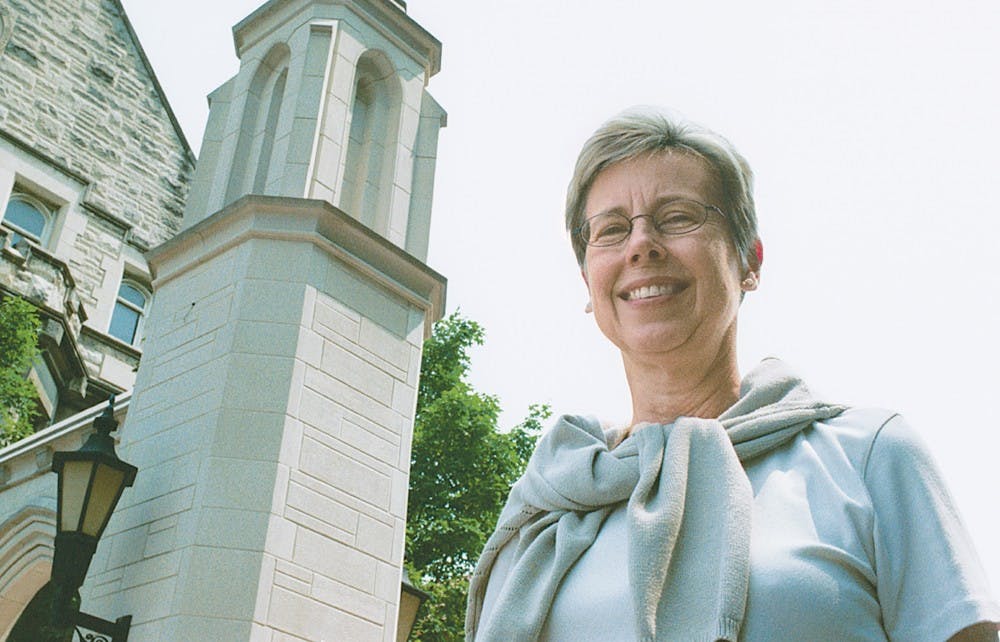Former IU Chancellor Sharon Brehm, a scholar, professor emerita and leader at IU, died March 30, 2018, from complications of Alzheimer’s disease.
Brehm, who was chancellor from 2001 to 2003, was the first woman to have the position. During her time as chancellor and vice president for academic affairs, she emphasized the importance of international education and hearing the concerns of all student groups on campus.
Friends and colleagues remembered her as energetic and conscientious. They said she was exuberant in the work she set out to do, whether it was as IU Chancellor, as a professor in the psychology department or as president of the American Psychological Association.
“She also gave Alzheimer’s patients a voice,” said Jim Sherman, professor emeritus in psychology. “She had conversations about what the disease was like and how it feels for patients and their families to make it understandable.”
Sherman met Brehm many years ago, long before she began working at IU. Their academic discipline, social psychology, is a relatively small area of work, so they met and interacted at multiple conferences.
Around the time Brehm was being interviewed for the position of IU Chancellor, the two of them had dinner together at a conference in San Antonio, Texas.
“I told her how wonderful IU was,” Sherman said. “I’d like to think I played a small role in promoting IU to her.”
Before coming to the University, Brehm had administrative roles at the University of Kansas, Binghamton University and Ohio University.
As chancellor, Brehm focused on improving the learning environment for students and faculty members. She was a vocal supporter of initiatives on all levels that increased academic and creative endeavors on campus.
"Indiana University is deeply saddened by the passing of Sharon Brehm, who served the university admirably as a senior administrator, an exceptional scholar and an enthusiastic teacher," IU President Michael McRobbie said in an IU press release.
Bruce Jacobs, former executive director of the Indiana Memorial Union, said Brehm was concerned with the well-being of students and their experiences on campus.
From meeting with students after the attacks on Sept. 11 to attending student-led meetings with the Residence Hall Association and other groups, Jacobs said Brehm went out of her way to stay involved in times of both turmoil and triumph.
Neil Theobald, whom Brehm hired in 2002 as Vice Chancellor, worked closely with her to implement a strategic planning process for the University. They chose a set of seven projects that added 69 faculty members in total.
Some of these projects included the creation of a human biology program, expanding on-campus language and culture facilities, increasing faculty support in the optometry and cognitive science departments, and creating an interdisciplinary environmental science program between the School of Public and Environmental Affairs and the College of Arts and Sciences.
“Chancellor Brehm was a visionary who began to propel IUB towards the academic heights it has reached under President McRobbie,” Theobald said.
After her term as chancellor, she worked as a professor in the psychology department. Her research focused on the intersection between social and clinical psychology. She co-authored one of the earliest books that tied the two disciplines together, which bolstered a once-overlooked dialogue between the social and developmental fields.
One of her proudest accomplishments, Sherman said, was serving as president of the American Psychological Association. After assuming the role in 2007, she initiated multiple task forces that focused on integrative healthcare for aging populations, as well as child development in math and science education.
"Sharon was a well-respected president of the prestigious American Psychological Association,” McRobbie said in the release. “She was also a great friend to and extremely generous supporter of the university, whose estate gift will fund an endowed chair in the Department of Psychological and Brain Sciences at IU-Bloomington.”
Sherman said Brehm's passion for the discipline and academics as a whole continued through her entire life, even when her memory began to falter.
In the early 2010s, he said he noticed Brehm was having trouble navigating the psychology department and remembering everyday things. He convinced her to go with him get a cognitive battery of tests done, which led to her diagnosis with Alzheimer’s disease.
“As the disease progressed, she wasn’t able to recognize us, which was the opposite of the early memories we had of her,” Sherman said. “It made us think more about how terrible of a disease it is.”
Despite this, Sherman said Brehm helped IU and the community understand Alzheimer’s beyond its definition as a disease. She proved a fulfilling life is possible after being diagnosed, he said.
“She made it OK for people to come out and say they have these experiences,” Sherman said. “She spoke out as a patient herself and gave others a better feeling because of it."




